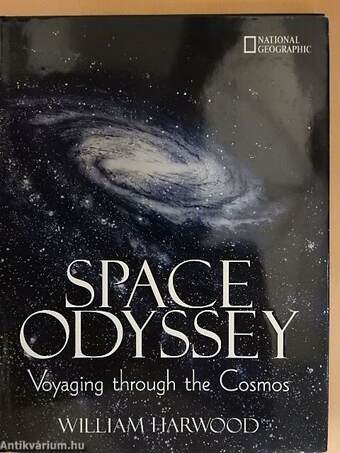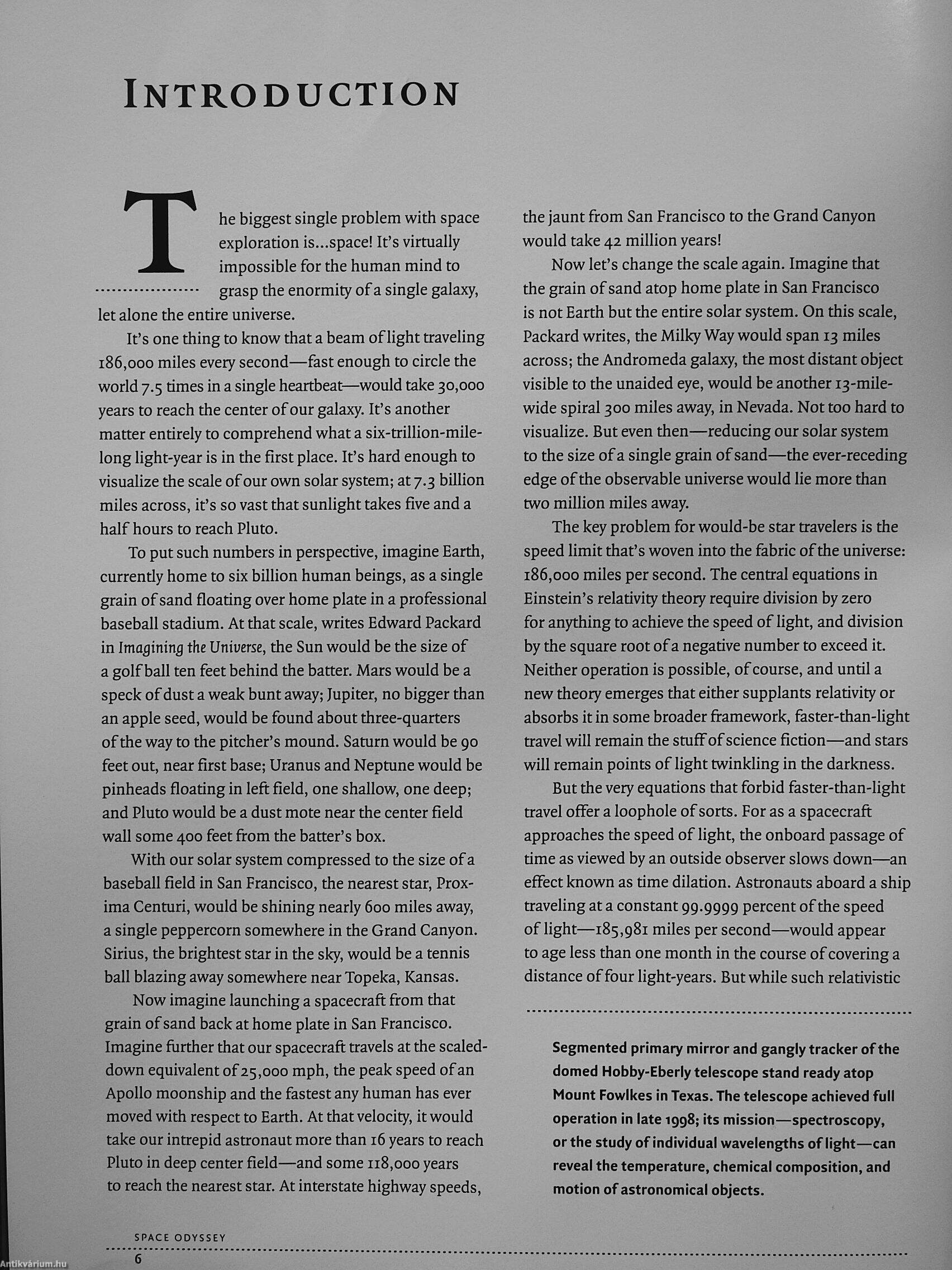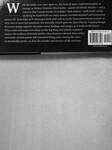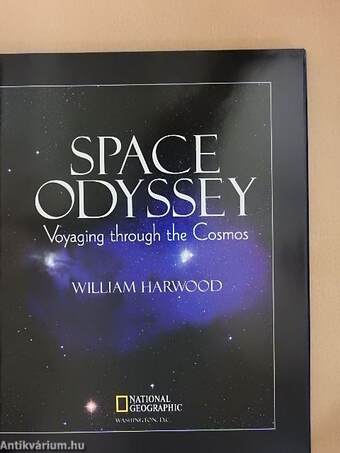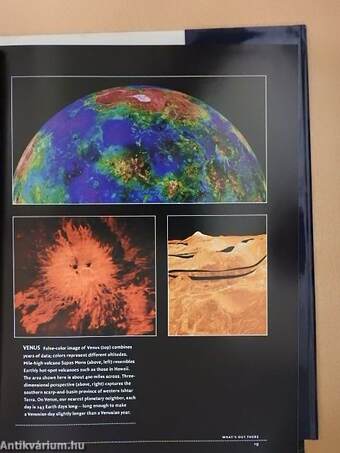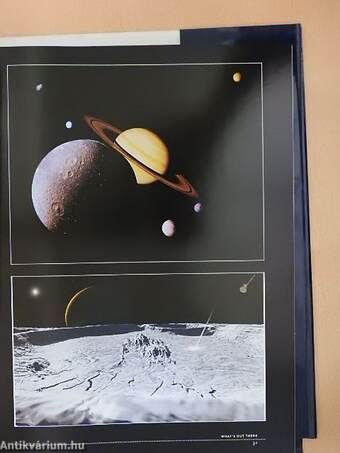1.063.465
kiadvánnyal nyújtjuk Magyarország legnagyobb antikvár könyv-kínálatát

VISSZA
A TETEJÉRE
JAVASLATOKÉszre-
vételek
Space Odyssey
Voyaging Through the Cosmos
| Kiadó: | National Geographic Society |
|---|---|
| Kiadás helye: | Washington |
| Kiadás éve: | |
| Kötés típusa: | Ragasztott kemény kötés |
| Oldalszám: | 224 oldal |
| Sorozatcím: | |
| Kötetszám: | |
| Nyelv: | Angol |
| Méret: | 31 cm x 24 cm |
| ISBN: | 0-7922-6354-5 |
| Megjegyzés: | Színes fotókkal gazdagon illusztrálva. |
naponta értesítjük a beérkező friss
kiadványokról
naponta értesítjük a beérkező friss
kiadványokról
Előszó
TovábbFülszöveg
What's out there? wonders author William Harwood
early in this book,
and—drawing upon the latest advances in astronomy and space technology—he depicts the state of our current knowledge. With a mounting sense of wonder, he guides us through the cosmos, beginning with our own solar system. Gradually he ventures farther into space, to the realms of nebulae and star clusters, of white dwarfs and "endlessly dying" black holes, of spiraling galaxies and neutron stars.
But if today's universe excites, tomorrow's odyssey surely dazzles. Ever larger optical and radio telescopes will peer into the most distant reaches of space; engineers will devise ever faster and more efficient rockets, greatly expanding our range throughout and possibly beyond the solar system; solar power plants on the Moon might one day beam energy to Earth, even as astronauts explore and perhaps colonize Mars. Meanwhile, heady phenomena such as wormholes, space-time warps, and cosmic strings continue to beguile... Tovább
Fülszöveg
What's out there? wonders author William Harwood
early in this book,
and—drawing upon the latest advances in astronomy and space technology—he depicts the state of our current knowledge. With a mounting sense of wonder, he guides us through the cosmos, beginning with our own solar system. Gradually he ventures farther into space, to the realms of nebulae and star clusters, of white dwarfs and "endlessly dying" black holes, of spiraling galaxies and neutron stars.
But if today's universe excites, tomorrow's odyssey surely dazzles. Ever larger optical and radio telescopes will peer into the most distant reaches of space; engineers will devise ever faster and more efficient rockets, greatly expanding our range throughout and possibly beyond the solar system; solar power plants on the Moon might one day beam energy to Earth, even as astronauts explore and perhaps colonize Mars. Meanwhile, heady phenomena such as wormholes, space-time warps, and cosmic strings continue to beguile theorists. Even now, researchers seeking extraterrestrial life are methodically searching 100,000 stars for Earth-like planets, hoping to answer not just what's out there—but who.
Cove/-: Whirling inexorably, a majestic spiral galaxy harbors billions of member stars and unknown hosts of other worlds.
mmm
With tiie iconic year 2001 upon us, the facts of space exploration grow as strange as fiction. Consider black holes—points of infinite density—and a universe that's made mostly of invisible "dark matter," stuff totally unlike
anything we know from our solar system. Yet from manned and unmanned
spacecraft, from high-tech telescopes both aloft and on Earth, from painstaking analysis of every sort of wave and spectrum, the scientific search goes on. Space Odyssey-.Voyaging through the Cosmos brings together the most recent findings and images as it looks to the future: When radio telescopes eavesdrop on the Big Bang and robotic explorers analyze the surfaces of distant worlds; when humans colonize Mars; when antimatter roclcets power self-contained flying cities among the stars. As knowledge grows, so does the wonder and mystery of the universe.
Science/Astronomy
978079226354854000 Vissza
Témakörök
- Idegennyelv > Idegennyelvű könyvek > Angol > Művészetek > Fotóművészet
- Természettudomány > Csillagászat > Bolygók > Egyéb
- Természettudomány > Csillagászat > Csillagok > Egyéb
- Természettudomány > Csillagászat > Idegennyelvű
- Természettudomány > Csillagászat > Világegyetem
- Művészetek > Fotóművészet > Albumok > Tematikus
- Művészetek > Fotóművészet > Idegen nyelv > Angol
- Művészetek > Fotóművészet > Témái > Természet
William Harwood
William Harwood műveinek az Antikvarium.hu-n kapható vagy előjegyezhető listáját itt tekintheti meg: William Harwood könyvek, művekMegvásárolható példányok
Nincs megvásárolható példány
A könyv összes megrendelhető példánya elfogyott. Ha kívánja, előjegyezheti a könyvet, és amint a könyv egy újabb példánya elérhető lesz, értesítjük.



